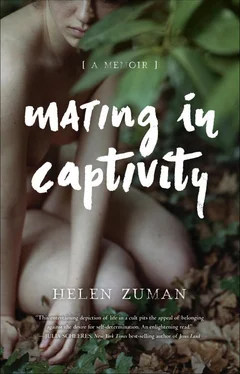By the time Rayel gave birth, in 2001, she’d seen Arol separate a number of mothers from their babies. Arol would convict the mother of bad mothering, then turn the child over to other Zendiks, usually for one or more stretches of multiple months. Rayel had delayed getting pregnant in part because she’d feared such treatment (which Swan alone had escaped). Choosing to risk childbearing, she’d let herself hope the pattern would break.
It didn’t. After bombarding her with charge after charge, Arol forbade Rayel to care for her infant. In the two months they were apart, Rayel sank into desolation so deep that Arol assigned her the therapeutic task of weaving baskets.
I could have gathered, from watching Rayel, that Zendik motherhood was a cliff to be approached with caution, if at all. Instead, riding high on Arol’s approval, I let my A-student arrogance prevail. Hadn’t I won the highest grades in the history of Dominican Academy? Hadn’t I been the first of its graduates to spend every single quarter on the Principal’s List? As in high school, I thought, so in child rearing: I would succeed where others had failed, because I was smarter and I would work harder.
I grinned back at Arol, bursting with pride and excitement.
“Yeah,” I said. “It would be wild to try to have kids.”
Arol waved to Kro to take off his headphones and come to the top of the stairs. He nodded at her, descended a few steps, nodded at me.
“What do you think of being a father?” she asked.
Kro backed into the railing and scrunched his nose into his eyebrows, as if working to merge what he’d just heard with life as he’d known it a moment ago.
“Let me get this straight,” he said, staring down at me. “ You wanna have a ba by?”
Maybe Kro knew, better than I did, how little my desire to have a baby had to do with having a baby.
“Yes. I do. I mean, I don’t know if it’ll happen, but I at least wanna try.”
He shook his head and shrugged. Arol and I had already hatched a plan. He could resist—or give in.
He glanced at Arol, then back at me, with a tiny, puzzled smile. “Okay,” he said, shifting his gaze between us. “If that’s what you want, I guess I’ll go along with it.”
In Arol’s embrace I felt I’d gained a great height—a subpeak, at least, in my climb to enlightenment. From here I saw further than my peers. This, it seemed, qualified me to steer them past snags in their lives.
One midsummer afternoon, I glimpsed a chance to inflict guidance.
I was in the Addition kitchen, winding down a counseling session, when Ethik—one of Swan’s ex-boyfriends and the Farm’s head carpenter—dropped in for a drink of water. Arol asked him how it was going with Eile. They’d had a few dates, in the past month.
Ethik sank into a seat at the table. “I like getting together with her,” he said, “but whenever we make contact outside of that, she acts all skittish, like a spooked horse. I can’t get her to calm down.”
Arol nodded. “Yeah, I’ve seen her get like that, too. She needs some kind of therapy. Something to ground her.”
I knew what Ethik and Arol were talking about. That summer I’d noticed a high, tinny tone to Eile’s laughter, a manic insistence on staying in motion. None of us linked her agitation to the break she’d recently been forced to make with Lysis, her longtime boyfriend. Had it come up, we would have dismissed it. They’d needed to separate. The fever between them had threatened their ardor for Zendik.
In addition to Ethik, a number of other men had hit Eile up for dates since her breakup. Often she said no. Sometimes her suitors waited a week or two and tried again. Maybe they were thick, or hard up for targets; maybe she hinted there was hope. In my story, warped by envy, she was enacting a plan to string men along: flirt, reject, flirt some more, reject again. I’d always wished to be the Girl With the Most Hit-Ups, not the Girl Most Likely to Hit Up the Guy Herself. Clearly, the swirl of pursuit around Eile was fucking her up.
As I listened to Ethik and Arol dissect Eile, I twisted my take on her state into a cure. Then, with Arol’s permission, I delivered my diagnosis—and my prescription: “I say, guys stop hitting her up. She has to hit on a different guy each week. That way, she can’t hook anyone into hoping she’s gonna say yes next time, or be his girlfriend.”
Arol nodded. “Sounds good to me. Why don’t you go let her know? You can keep an eye on her to make sure she follows through.”
With that, I became Eile’s warden.
Sometimes captives strike back.
The first mark Eile chose was Kro.
When he agreed to a date with her, I feigned indifference—recalling, with relief, that she’d have to try someone new the next week.
For a month or so, Eile followed her program. Had it calmed her? I couldn’t tell. I did sense rising hostility in her vibe toward me—a healthy defense against being treated with arrogance for an illusory disease. I retaliated by complaining to Arol, who sustained my plea to drop responsibility for Eile’s therapy. “I’m not gonna try to help someone who doesn’t wanna be helped,” I declared to the group at lunch one afternoon. “I don’t deserve that kind of anger coming at me.”
In my mind, I’d done my best to save Eile—and she’d resolved to stay lost. Whatever followed was her own fault.
A week later, at lunch, Eile dropped, flushed and breathless, into the seat next to me. I was clustered with most of the other girls at one end of the long table dominating the dining hall. She seemed tightly wound yet somehow grounded, as if her manic electricity had found a central meridian.
“You guys, I’ve decided. I’m going out.”
What? No one spoke. She hurried on. “I feel like I still have fantasies to deal with. Like dancing out in the world. And marrying a rich guy who’ll take care of me.”
Eile had danced before Zendik. She’d even moved to New York City to test her chances of dancing professionally. At the Farm, she’d danced with Swan, but always in supporting roles, and for long stretches she hadn’t danced at all. She may have known, deep down, that if she couldn’t dance, she couldn’t be part of our revolution.
The rich husband? Maybe he played the same role for Eile that rape played for me. Had Zendik taught her she wanted him, even as it warned her the want was corrupt and could be crushed only through suffering?
The other girls—Karma, Cayta, Mar, Riven—peppered her with variations on the same cautions I’d heard a year earlier, before I’d left for Idaho: “Hang in—you’ll get through this.” “Can’t you work out your fantasies in your head?” “People don’t change when they go out; they just get more desperate.” “Why do you want more of the same old pain?”
None of them had ever gone “out.”
I said nothing till they left the table. Then I turned to Eile. Her face was still flushed; her breathing had calmed. “I don’t think it’s wrong to go out,” I said. “Sometimes you have to hit bottom to feel what you really want.” I described my civil war of the previous summer—how I’d wanted to want to come back to Zendik all along but hadn’t actually wanted to till after Alvin’s assault. Facing him—in the myth I’d spun since then—had both spurred my return and firmed my resolve. Maybe the plunge Eile was about to take would raise her, someday, to a perch as high as mine.
The next morning, Kro and I happened to be on the porch roof of the Farmhouse, priming a section of second-floor siding for a coat of sunflower yellow, when Eile’s mother inched her station wagon down from the dining hall and stopped at the top of the driveway. The backseat was crammed with Eile’s stuff. The passenger seat was empty. Maybe Eile was doing a final sweep of her space or saying a last goodbye. Just as she reached the car and grabbed the door pull, Kro caught my eye and waved his paintbrush at the boom box he’d set on a windowsill. The song “Mother and Child Reunion,” from the album Paul Simon , was playing.
Читать дальше











